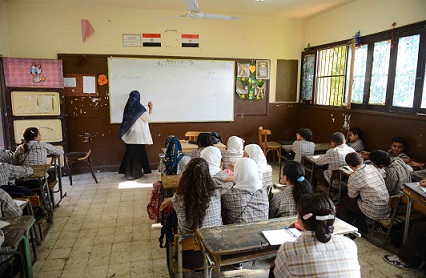
(DNE File Photo)
The Ministry of Finance announced that teachers will obtain “financial advantages”, or a salary which is higher than the minimum wage, according a statement from the ministry.
The ministry made this statement in a response to allegations that teachers will not be included in the minimum wage system, which is scheduled to come into effect in January 2014.
In September, the cabinet decided to set a minimum wage of EGP 1,200 for public workers. Minister of Finance Ahmed Galal announced in October that government employee wages will range from EGP 1,201 to EGP 3,740, and that over 4.8 million workers will benefit from the minimum wage law.
The ministers of Finance and Education discussed adjusting the minimum wage level for teachers by increasing their salaries such that they can be covered by the public treasury, according to the statement.
“The interim government is committed to taking measures which contribute to raising the efficiency of the educational process through improving both wages and the work environment in schools,” the ministry stated.
Teachers had organised a strike against the government under former Prime Minister Essam Sharaf in September 2011, demanding an increase in their wages and living standards. They demanded a minimum wage of EGP 1,200 and a 200% bonus for all public sector workers.
Tens of thousands of teachers participated in the strike, which lasted for weeks; however, the government cited economic difficulties as reasons for its inability to meet their demands. In September 2012, teachers organised another strike with similar demands.
In 2007, the education law was amended in a way that gives the government more authority over the appointment of teachers.
The economic ministerial group, headed by Prime Minister Hazem El-Beblawi, met on Tuesday to discuss measures for implementing the maximum and minimum wage law in January.
An official report from the finance ministry showed that public expenditure included EGP 141bn for wages and compensation in the 2012/2013 fiscal year, which represents a 14.8% increase from the preceding year.
According to Galal, implementing the minimum wage law will cost the public treasury upwards of EGP 20bn.
Meanwhile, the implementation of the minimum wage within the private sector is still under discussion between the government, businessmen, associations and investors.
The cabinet has set a maximum wage of EGP 42,000 for state officials, which is 35 times more than the minimum income level. However, Minister of Social Solidarity Ahmed El-Boraie had decided in November to exempt public banks and oil companies from the maximum wage law in order to allow the sectors to compete with their private counterparts.




